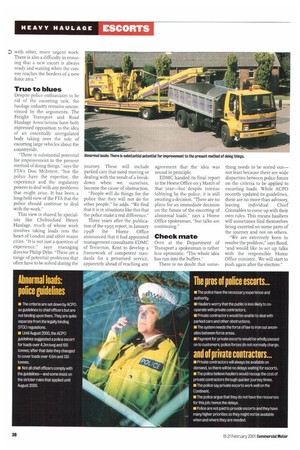D with other, more urgent work. There is also a
Page 40

If you've noticed an error in this article please click here to report it so we can fix it.
difficulty in ensuring that a new escort is always ready and waiting when the convoy reaches the borders of a new force area."
True to blues
Despite police enthusiasm to be rid of the escorting task, the haulage industry remains unconvinced by the arguments. The Freight Transport and Road Haulage Associations have both expressed opposition to the idea of an essentially unregulated body taking over the role of escorting large vehicles about the countryside.
"There is substantial potential for improvement to the present method of doing things," says the FTA's Don McIntyre, "but the police have the expertise, the experience and the regulatory powers to deal with any problems that might arise. It has been a long-held view of the FTA that the police should continue to deal with the work."
This view is shared by specialists like Chelmsford Heavy Haulage, much of whose work involves taking loads into the heart of London and other major cities. "It is not just a question of experience," says managing director Philip Dyke. "There are a range of potential problems that often have to be solved during the
journey. These will include parked cars that need moving or dealing with the result of a breakdown when we, ourselves, become the cause of obstruction.
"People will do things for the police that they will not do for other people," he adds. "We find that it is in situations like this that the police make a real difference."
Three years after the publication of the 1995 report, in January 1998 the Home Office announced that it had appointed management consultants EDMC of Tenterton, Kent to develop a framework of competent standards for a privatised service, apparently ahead of reaching any
agreement that the idea was sound in principle.
EDMC handed its final report to the Home Office on 3 March of that year—but despite intense lobbying by the police, it is still awaiting a decision. "There are no plans for an immediate decision on the future of the escorting of abnormal loads," says a Home Office spokesman, "but talks are continuing."
Check mate
Over at the Department of Transport a spokesman is rather less optimistic: "The whole idea has run into the buffers."
There is no doubt that some
thing needs to be sorted out— not least because there are wide disparities between police forces on the criteria to be applied to escorting loads. While ACPO recently updated its guidelines, these are no more than advisory, leaving individual Chief Constables to come up with their own rules. This means hauliers will sometimes find themselves being escorted on some parts of the journey and not on others.
"We are extremely keen to resolve the problem," says Bond, "and would like to set up talks with the responsible Home Office minister. We will start to push again after the election."




































































































